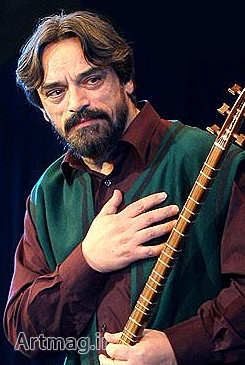
● Birthplace: Tehran
● Website: www.hosseinalizadeh.net
Biography
He was born in Sayyed Nasr al-Din district of Tehran Bazar, from a father of Urmia and a native of Tehran. After studying at the Conservatory of Music, he went to the Faculty of Fine Arts of the University of Tehran. He has taught music to Houshang Zarif, Habibollah Salehi, Mahmoud Karimi, Ali Akbar Shahnazi, Dariush Safavat, Nour Ali Boroumand, Saeed Hormozi, Youssef Forutan and Abdullah Davami in the early years of the solar decade at the Free University of Berlin. Master Alizadeh was a member of the Rudaki Orchestra in year 4. She performed two concerts at Shiraz Art Festival. He has joined the Chavoush Center, along with other Iranian music masters, including Mohammad Reza Lotfi and Parviz Meshkatian, who has performed immortal works in Iranian music called Chavoush Albums, and has also had a significant impact on the education of musicians and post-revolutionary music educators. put. In the early seventies he headed the music school. He has been performing concerts and performances in various countries with Mohammad Reza Shajarian in a four-person band together with Kayhan Kalhor and Homayoun Shajarian. Master Hossein Alizadeh taught at the Center for the Intellectual Development of Children and Adolescents from the early 1950s, and at the same time pursued the formation of conservation and diffusion center groups, national mystic groups. During these years, Alizadeh added a new form to Iranian music by producing and performing pieces such as Horsemen of the Plain of Hope and Fence, which showed his ingenuity. The creation of the Nine and Orchestra Concert, titled Nineveh in the early sixties, made Alizadeh’s name more popular than ever. This piece, performed by Ney Jamshidandlibi as a reed soloist, is one of the most prominent pieces in Iranian music history, which Alizadeh composed inspired by the developments of the early 1960s. After the Chavush Institute closed down, Alizadeh went to Berlin for a degree in music, returning to Iran in the mid-sixties, rebuilding Sheyda and Aref’s ensemble, resulting in a passionate concert with the voice of Shahram Nazeri, Sedif Farfid and Bijan. Kamkar was in the Vahdat Hall. The concert was later released by Shahram Nazeri in an album of the same name.
Master Hossein Alizadeh, then experimented with the creation of a variety of music that in the field of Iranian music in the form of solos can be found in works such as Turkmen, Dancing, Homayoun (with three strings) and Mahour, Hajrani, Hamnavani, Nova (Tar). The band featured The Secret and Needles albums (with the voice of Alireza Eftekhari) in the morning (with the voice of Mohsen Keramati) and the works as a band (Mehr, The New Secret, Watching the White Waters, Ni-Nova, Insane and Kurdish Variations).
He has also had some successful experiences in the field of film music, including: Shepherd of the Desert, Hossein Mahjub, Dell Shadegan, Ali Hatami, Gabbe, Mohsen Makhmalbaf), Eshghe Taher, Mohammad Ali Najafi, Iran Sarai Me, by Parviz Kimiavi, A Time for Horse Drunkenness, by Bahman Ghobadi, Clouds and Sunshine, by Mahmoud Clari, Ancient Legacy, by Seyed Mohammad Mir Soltani), Ugly and Beautiful, by Ahmad Reza Motamedi), Turtles fly, Bahman Ghobadi’s work, Newmanang, Bahman Ghobadi’s work and the TV series soundtrack under the razor. He has also had successful experiences in publishing books and educational albums, publishing ten pieces for Tar, in 4 volumes, by Mirza Abdullah (Running with Thread and Thread), Thread and Thread High School to Advanced (Book and Tape) Kisses. His work in the field of rain (the Tanafiyeh Collection) and the piece by Nova. He began collaborating with Mohammad Reza Shajarian, Kayhan Kalhor and Homayoun Shajarian in the late 1970s, resulting in concerts in Europe and the United States and a concurrent Babam Concert in Tehran at the National Hall. Shajarian’s and Alizadeh’s collaborations have been the subject of screaming, babooning, rambling, winter and Nova albums.
He collaborated with Giovanni Gasparian in 2004, which resulted in a concert at Niavaran Palace, which was later released as an album called Watching the White Waters and went to the final stage of the Grammy Award for World Music. He has had a number of successful experiences in assisting in the development of new instruments, including the invention of pulverized instruments, which he now uses in his concerts. He was also a pioneer in introducing instrumentalists, and in his concerts he mentioned instrumentalists with whom he performed solo in a concert brochure. Master Alizadeh formed a group called Zorbang, which resulted in performances in several European countries. Thinking of new experiences in the field of vocal music many years ago, he developed the experience by forming a band called Together Avian, whose latest performance this summer announced his new ideas in the field.
In a letter on December 7 2014, Master Hossein Alizadeh withdrew his letter from the Knights of French Art and Literature and wrote that he did not need to receive any address. “If the French political and cultural ambassador instills the gift of the nation with French culture to our great artists, we will honor it and we will honor the glorious stars of our history,” he said. In a critical tone, he added: “Perhaps if the authorities had paid attention to and understanding of the great art of music, there would not have been such a subtle gift and title. When there is not enough light in the art space, a small sunlight is lit. At the end of his letter, he wrote: “While appreciating the officials of the country and the French Embassy, I am satisfied with the respect of the Iranian artistic and artistic people by the name of Hossein Alizadeh. In his letter, Hussein Alizadeh did not provide a clear reason for the move.
Works
1982 – Mahour – Mahour – Singing with Tar
1983 – Sehgah – Mahour – Singing with Tar
1983 – Neynava – Mahour – Karshmeh
1983 – Nowruz – Shahram Nazeri, World Network
1988 – Turkmen – Mahour – Solo playing – An innovation with Tar
1988 – Shoorangiz – Mahour – Shahram Nazeri
1988 – Secret and Need – Mahour – Alireza Eftekhari Mahour – Performed with Aref Group
1990 – Nobang Kohan – Mahour
1991 – Avae Mehr – Mahour
1993 – Dance – Mahour – Singing – Innovation with Setar
1996 – Raz No – Afsaneh Rathaei, Mohsen Keramati, Ali Samadpour Mahour
1999 – Album From The Ages – Mahour – Afsaneh Rathaei, Mohsen Keramati, Ali Shirazi
2001 – Chahargah – Bayat Turk – Mahour – in collaboration with Hossein Koooli and Mohammad Ghoi-Halm
2001 – Hijrani – Mahour
2002 – Sallaneh – Mahour
2003 – Watching the White Waters – Afsaneh Rathai – Hermes – in collaboration with Jivan Gasparian – Was nominated for a Grammy Award for Best Traditional Music in the World.
2007 – Silent Instrument – Heart of Singing – Mohammad Reza Shajarian
2007 – Mehr Anthem – Del Avaz – Mohammad Reza Shajarian
2007 – Anthem of Flowers – Legend of Grief – Tonbak Majid Khalaj
2008 – An and An – Hermes – Setar and Tonbak duet with Pejman Haddadi
2009 – Moon and May – Hermes – Exciting Soloist
2009 – If I Was A Bird – Rahela Barzegari (Raha) – California, USA Publishing, Singing, Composing and Singing Group with Hamavaavaian
2009 – The Sound of Light – The Sound of the Sun in Iran and Participating with Music in Europe – The Exciting Duo
2013 – Badeh Tooi – Naghmeh Hesar – with the group of all voices
2013 – Sarbedaran – Farhad Fakhreddini – Bijan Kamkar – Saba Studio – The soundtrack of Sarbedaran TV series
2014 – Badeh Tooi Concert – with Hamavaavaian Ensemble – Video Album (Recording Concert) Related to Live Performance
2015 – Eshghim Gol – Single: Mohammad Motamedi – with Hamavayan group
– Kurdish Variations – Orchestral
– Rebellion – Orchestral
– Riders of Omid Plain – Bijan Kamkar, Shahram Nazeri
– Fence – a piece of music
– Nova Device – Parisa (Fatemeh Vaezi)
– Mahour – Parisa (Fatemeh Vaezi)
– Concert – Homayoun – Mahour – Donavazi – An Innovation with Majid Khalaj’s Setar and Tonbak
– Right – Panjgah – Mahour – Donavazi – An innovation with Majid Khalaj’s tar and tonbak
– Nova – Mahour – Donovazi – with Majid Khalaj’s tar and tonbak
– Symphony – Mahour – With the collaboration of Arshad Tahmasebi and Dariush Zargari
– Songs of Azerbaijan
– Morning – Mahour – Mohsen Keramati
– Fairy and the story of the daughters of the grandmother of the sea – Mahour – Birds – Homa Niknam and Tonbak Majid Khalaj
– New Instrument – Majid Khalaj’s mourning and tonbak legend
– Mothers of the Earth – Homa Niknam, Afsaneh Jahangiri, Parvin Namazi Tonbak Majid Khalaj
– It’s Winter – Singing Heart – Mohammad Reza Shajarian
– You Can’t Live Without It – Del Avaz Singing – Mohammad Reza Shajarian
– Faryad – Del Avaz – Mohammad Reza Shajarian
Film Music
1980 – The Desert Shepherds
1991 – Del Shodegan – Mohammadreza Shajarian – Del Sang
1995 – Gabbeh – Mahoor – Winner of the Crystal Simorgh best Soundtrack of Fajr film Festival
1996 – Clouds And Sunshine
1997 – A School Carried Away by the Wind
1998 – Iran Is My Home – Mahoor
1998 – Ugly And Beautiful – Mahoor – Winner of Crystal Simorgh Best Soundtrack in Fajr film Festival
1999 – Sun Girls
1999 – Love Taher
2002 – Abjad
2005 – The Realm of Heaven – Part of the Messianic Kingdom soundtrack – The Ridley Scott Film,
2007 – The Turtles Also Fly – mahoor
2007 – Half Moon
2008 – Song of Sparrows – Hermes winner of Crystal Simorgh Best Soundtrack of Fajr film Festival
2009 – On The Side – The song of the Sun-documentary soundtrack All My Moms
2011 – The Queen – Winner of the Crystal Simorgh best Soundtrack of Fajr film Festival
2012 – Dar Chashm-e Baad – TV series
2012 – Shallow Yellow Skies
– TV series under Blade – Mahoor
– Album of the Ages-part of the ancient Legacy documentary soundtrack -singers: Mohsen Keratmati, Afsaneh Rasaai and Ali Shirazi
Books
– Ten Pieces for Tar 1
– Ten Pieces for Tar 2
– Ten Pieces for Tar 3
– Ten Pieces for Tar 4
– Setar Training, Introductory Course
– Thread and Thirty Secondary Education
– Primary Row of Tar and Setar (Third Book of the Conservatory)
– Rain Kisses – Hossein Alizadeh’s Ballads, Mahoor Publications, 2, Rewriting and Painting: Ali Samadpour
Initiatives
Sallaneh is an instrument made by Siamak Afshari under the supervision of Master Alizadeh and has a recurring sound. The invention of the clutter position, which is a combination of the cluster corner of the Mahur machine and the cluster corner of the Homayoun machine, is another of Hussein Alizadeh’s initiatives.
Training
Alizadeh resumed his educational activities in 2011 with the title: Alizadeh School and for this purpose he launched a website with the same title and introduced this website as the only official and approved website.
Awards
Master Hossein Alizadeh, had three times for the albums of yelling, not to be headed by, and watched White waters, a Grammy nominated, in the part of the world’s best Traditional album. Grammy Awards are the most prestigious and recorded music industry awards in the United States. It has also gained honor for four times the best Film Music Award from Fajr Film Festival for films: Gabbeh, Ugly and beautiful, singing Sparrow and Queens. Awarded the best soundtrack for a shallow yellow sky movie at the celebration of the Iranian Film Critics Association is 2013 of the other prizes.



